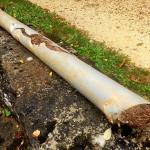
4 Tips to Avoid Plumbing Problems
By Fluid Plumbing|March 09, 2017
Plumbing problems can be a nightmare. Something that seems simple to fix at the beginning can quickly escalate into a major issue that can be hazardous to your health and cause damage to your home. It is vital that you get any plumbing problems seen to by a professional as quickly as possible if you want to stay safe and healthy.
There are steps you can take to reduce the risk of plumbing problems in your home. Here, Fluid Plumbing, your local plumbers on the Central Coast, share some of their expert advice to help prevent the misery of plumbing disasters.
The problems your plumbing can cause
Your plumbing may seem to take care of itself, but if you leave a problem unattended it can cause a wide variety of problems for you and your home. Blocked drains are particularly hazardous. If left, the waste products trapped in your drain will begin to decompose. This will not only cause bad smells throughout your home, it is also an ideal breeding ground for bacteria and a variety of insects.
A blocked drain can also cause major structural damage to your home. If a drain overflows it can cause the ground to become waterlogged and your house could subside. This major structural damage is extremely costly and time-consuming to fix.
In addition, it is vital all plumbing work is carried out by a qualified and experienced professional, as someone who doesn’t know what they are doing can make things a lot worse.
How to prevent plumbing problems
1. Keep your sink clear
Many of us use our sinks as a convenient form of waste disposal when cooking, but this is a major cause of blocked drains. You should never pour used cooking oil or fat down your sink, as these can prevent water from being able to flow through your drains. In addition, make sure you use a sink strainer to stop any scraps of food from being able to escape down your plughole and block your drains.
2. Respect your toilet
Nothing other than the absolute necessaries should ever be flushed down your toilet. Sanitary products, paper towels, cleaning cloths and nappies can all cause serious blockages. Even wet wipes, which are labelled flushable, can block your drains. All these items should never be flushed down the toilet. Instead, they should be bagged up and binned in a safe and hygienic manner.
3. Trim your trees
A surprisingly high percentage of drain blockages are caused by tree roots that have become too long and cracked the drainpipes. Palm and Fig trees are two of the worst offenders. Keeping your trees trimmed will help to prevent the roots from growing too long. In addition, you can have your drains checked by an expert if you think this could be a problem.
4. Have hot water systems properly installed
Hot water systems should always be installed by a qualified plumber who is certified to do so. If you have an electric hot water system installed by a plumber who is not certified, your system will not be covered by your insurance and your warranty will be invalidated.
Call the Experts
Fluid Plumbing can help with any plumbing problems in your home and provide advice if you are worried. Call to speak to one of their expert professionals and avoid the headaches that plumbing problems can cause.
There are steps you can take to reduce the risk of plumbing problems in your home. Here, Fluid Plumbing, your local plumbers on the Central Coast, share some of their expert advice to help prevent the misery of plumbing disasters.
The problems your plumbing can cause
Your plumbing may seem to take care of itself, but if you leave a problem unattended it can cause a wide variety of problems for you and your home. Blocked drains are particularly hazardous. If left, the waste products trapped in your drain will begin to decompose. This will not only cause bad smells throughout your home, it is also an ideal breeding ground for bacteria and a variety of insects.
A blocked drain can also cause major structural damage to your home. If a drain overflows it can cause the ground to become waterlogged and your house could subside. This major structural damage is extremely costly and time-consuming to fix.
In addition, it is vital all plumbing work is carried out by a qualified and experienced professional, as someone who doesn’t know what they are doing can make things a lot worse.
How to prevent plumbing problems
1. Keep your sink clear
Many of us use our sinks as a convenient form of waste disposal when cooking, but this is a major cause of blocked drains. You should never pour used cooking oil or fat down your sink, as these can prevent water from being able to flow through your drains. In addition, make sure you use a sink strainer to stop any scraps of food from being able to escape down your plughole and block your drains.
2. Respect your toilet
Nothing other than the absolute necessaries should ever be flushed down your toilet. Sanitary products, paper towels, cleaning cloths and nappies can all cause serious blockages. Even wet wipes, which are labelled flushable, can block your drains. All these items should never be flushed down the toilet. Instead, they should be bagged up and binned in a safe and hygienic manner.
3. Trim your trees
A surprisingly high percentage of drain blockages are caused by tree roots that have become too long and cracked the drainpipes. Palm and Fig trees are two of the worst offenders. Keeping your trees trimmed will help to prevent the roots from growing too long. In addition, you can have your drains checked by an expert if you think this could be a problem.
4. Have hot water systems properly installed
Hot water systems should always be installed by a qualified plumber who is certified to do so. If you have an electric hot water system installed by a plumber who is not certified, your system will not be covered by your insurance and your warranty will be invalidated.
Call the Experts
Fluid Plumbing can help with any plumbing problems in your home and provide advice if you are worried. Call to speak to one of their expert professionals and avoid the headaches that plumbing problems can cause.



